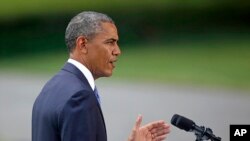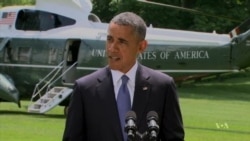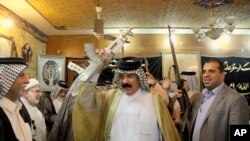While promising to pursue diplomacy, U.S. President Barack Obama said Americans "will do our part" to help Iraq confront the Islamic insurgents rampaging through that country.
"We will not be sending U.S. troops back into combat in Iraq," Obama said, but he and his national security advisers "will be reviewing other options."
The president, speaking from the White House grounds, said he and his team have been meeting since yesterday to address how to help Iraq turn back the Islamic State of Iraq and the Levant (ISIL), which he said threatens not only Iraq and the Middle East, but possibly American interests as well.
Watch related video report by VOA's Luis Ramirez from the White House:
The president said the militants who have overrun parts of Iraq are a threat to the Baghdad government and people throughout the country, and pose an active threat to American interests as well. He said division among Iraq's leadership has led to the current crisis.
"Over the past decade, American troops have made extraordinary sacrifices to give Iraqis an opportunity to claim their own future," said Obama. "Unfortunately, Iraqi leaders have been unable to overcome, too often, the mistrust and sectarian differences that have long been simmering there. And that's created vulnerabilities within the Iraqi government as well as their security forces."
Though the U.S. already has increased training, equipment and intelligence, the president said, Iraq "needs additional support to break the momentum."
He said any military action would have to be "targeted, precise and effective."
He did not indicate what those actions might entail. But according to news reports, the aircraft carrier U.S.S. George H.W. Bush already is steaming from the Arabian Sea toward the Persian Gulf and U.S. fighter jets are stationed at bases within striking distance of the insurgents.
Obama said the government of Iraqi President Nouri al-Maliki, a Shi'ite, must exercise diplomacy and "work to set aside sectarian differences and account for legitimate differences" among all Iraqis.
"We’re not going to allow ourselves to be dragged back into a situation," he said.
Cleric calls for civilian fighters
Also Friday, Iraq’s leading Shiite cleric called upon Iraqi civilians to join the country’s security forces in fighting the insurgents, AFP news service reported.
A spokesman for the reclusive and influential Grand Ayatollah Ali al-Sistani announced at the main weekly prayers at the Shiite shrine city of Karbala that “he who sacrifices for the cause of defending his country and his honor will be a martyr.”
Kerry, British FM show unity
In a show of unity earlier today, the foreign secretaries of the United States and Britain said their respective countries would work to help stabilize the situation there and push Iraq’s leaders to overcome sectarian differences and build political cohesion.
U.S. Secretary of State John Kerry and British Foreign Secretary William Hague, at a global summit in London, said on Friday that their nations would collaborate on support for Iraq’s government, under siege by ISIL militants.
Rebels, who have seized several key cities and terrified civilians and Iraqi soldiers, are bearing down on the capital city of Baghdad.
"We are laser-focused on dealing with the crisis at hand," Kerry said, saying he expects President Barack Obama to make "timely decisions'' on Iraq.
The United States already has increased military shipments this year, especially in the last month, and has expanded training programs in Iraq and Jordan. The State Department announced yesterday it was providing more than $12 million in emergency humanitarian aid.
"But just as important as any short-term action," Kerry said, is having Iraqi Prime Minister Nouri al-Maliki do more to overcome sectarian differences.
"This needs to be a wakeup call for all of Iraq’s leaders," Kerry said.
Hague, saying Britain was "looking urgently at ways to assist" in managing the crisis, said his government, like the United States’, is working with the United Nations Security Council and is providing assistance such as counterterrorism expertise.
"We will work closely with the United States and with all our allies," Hague said, emphasizing that in stabilizing the situation, "this does not mean we are planning a military intervention ourselves."
Call to end violence
The men were joined in the press conference by actress Angelina Jolie, co-host with Hague of the summit on ending sexual violence in conflict. The international gathering drew hundreds of participants. Jolie said she found it "heartening to see so many male leaders … here to confront taboos."
Kerry drew a link between the conference focus and the Iraq crisis, where an estimated 500,000 people have been displaced as ISIL militants took over the city of Mosul earlier this week.
"Ending the cycle of violence is not just a personal priority, it is a priority … of the U.S. government and its allies," he said.
Kerry called ISIL, notorious for beheadings, a terrorist organization "so extreme that even al-Qaida saw fit to disassociate itself for a time."
ISIL, Kerry said, poses a threat not only to Iraq and the Middle East but to Europe and the United States. ISIL plots against the West have been exposed, he said, "so there is a vital interest" in continued U.S. involvement.
The U.S. has had an advisory role in Iraq since withdrawing all troops in 2011 after eight consecutive years of war there.
Connection with Syria
The crisis in Iraq – in which parts of the Iraqi military has collapsed and Kurds, taking advantage of the chaos, siezed control of the northeastern, oil-rich city of Kirkuk -- is "a consequence of what is happening in Syria," Kerry said.
Jihadists attracted to the fight to depose Syrian President Bashar al-Assad have created "spillover violence, a spillover humanitarian crisis."
"Everybody in the Middle East needs to be concerned," Kerry said.
Kerry said the United States and its allies have been working on political leadership in Iraq for several years. He suggested the crisis might goad Iraq’s Sunni and Shiite sectarian factions to come together.
"This may be a moment where [they] can actually coalesce," Kerry said, "recognizing there is a threat to them as a whole."
VOA's Luis Ramirez contributed to this report from the White House.
"We will not be sending U.S. troops back into combat in Iraq," Obama said, but he and his national security advisers "will be reviewing other options."
The president, speaking from the White House grounds, said he and his team have been meeting since yesterday to address how to help Iraq turn back the Islamic State of Iraq and the Levant (ISIL), which he said threatens not only Iraq and the Middle East, but possibly American interests as well.
Watch related video report by VOA's Luis Ramirez from the White House:
The president said the militants who have overrun parts of Iraq are a threat to the Baghdad government and people throughout the country, and pose an active threat to American interests as well. He said division among Iraq's leadership has led to the current crisis.
"Over the past decade, American troops have made extraordinary sacrifices to give Iraqis an opportunity to claim their own future," said Obama. "Unfortunately, Iraqi leaders have been unable to overcome, too often, the mistrust and sectarian differences that have long been simmering there. And that's created vulnerabilities within the Iraqi government as well as their security forces."
Though the U.S. already has increased training, equipment and intelligence, the president said, Iraq "needs additional support to break the momentum."
He said any military action would have to be "targeted, precise and effective."
He did not indicate what those actions might entail. But according to news reports, the aircraft carrier U.S.S. George H.W. Bush already is steaming from the Arabian Sea toward the Persian Gulf and U.S. fighter jets are stationed at bases within striking distance of the insurgents.
Obama said the government of Iraqi President Nouri al-Maliki, a Shi'ite, must exercise diplomacy and "work to set aside sectarian differences and account for legitimate differences" among all Iraqis.
"We’re not going to allow ourselves to be dragged back into a situation," he said.
Cleric calls for civilian fighters
Also Friday, Iraq’s leading Shiite cleric called upon Iraqi civilians to join the country’s security forces in fighting the insurgents, AFP news service reported.
A spokesman for the reclusive and influential Grand Ayatollah Ali al-Sistani announced at the main weekly prayers at the Shiite shrine city of Karbala that “he who sacrifices for the cause of defending his country and his honor will be a martyr.”
Kerry, British FM show unity
In a show of unity earlier today, the foreign secretaries of the United States and Britain said their respective countries would work to help stabilize the situation there and push Iraq’s leaders to overcome sectarian differences and build political cohesion.
U.S. Secretary of State John Kerry and British Foreign Secretary William Hague, at a global summit in London, said on Friday that their nations would collaborate on support for Iraq’s government, under siege by ISIL militants.
Rebels, who have seized several key cities and terrified civilians and Iraqi soldiers, are bearing down on the capital city of Baghdad.
"We are laser-focused on dealing with the crisis at hand," Kerry said, saying he expects President Barack Obama to make "timely decisions'' on Iraq.
The United States already has increased military shipments this year, especially in the last month, and has expanded training programs in Iraq and Jordan. The State Department announced yesterday it was providing more than $12 million in emergency humanitarian aid.
"But just as important as any short-term action," Kerry said, is having Iraqi Prime Minister Nouri al-Maliki do more to overcome sectarian differences.
"This needs to be a wakeup call for all of Iraq’s leaders," Kerry said.
Hague, saying Britain was "looking urgently at ways to assist" in managing the crisis, said his government, like the United States’, is working with the United Nations Security Council and is providing assistance such as counterterrorism expertise.
"We will work closely with the United States and with all our allies," Hague said, emphasizing that in stabilizing the situation, "this does not mean we are planning a military intervention ourselves."
Call to end violence
The men were joined in the press conference by actress Angelina Jolie, co-host with Hague of the summit on ending sexual violence in conflict. The international gathering drew hundreds of participants. Jolie said she found it "heartening to see so many male leaders … here to confront taboos."
Kerry drew a link between the conference focus and the Iraq crisis, where an estimated 500,000 people have been displaced as ISIL militants took over the city of Mosul earlier this week.
"Ending the cycle of violence is not just a personal priority, it is a priority … of the U.S. government and its allies," he said.
Kerry called ISIL, notorious for beheadings, a terrorist organization "so extreme that even al-Qaida saw fit to disassociate itself for a time."
ISIL, Kerry said, poses a threat not only to Iraq and the Middle East but to Europe and the United States. ISIL plots against the West have been exposed, he said, "so there is a vital interest" in continued U.S. involvement.
The U.S. has had an advisory role in Iraq since withdrawing all troops in 2011 after eight consecutive years of war there.
Connection with Syria
The crisis in Iraq – in which parts of the Iraqi military has collapsed and Kurds, taking advantage of the chaos, siezed control of the northeastern, oil-rich city of Kirkuk -- is "a consequence of what is happening in Syria," Kerry said.
Jihadists attracted to the fight to depose Syrian President Bashar al-Assad have created "spillover violence, a spillover humanitarian crisis."
"Everybody in the Middle East needs to be concerned," Kerry said.
Kerry said the United States and its allies have been working on political leadership in Iraq for several years. He suggested the crisis might goad Iraq’s Sunni and Shiite sectarian factions to come together.
"This may be a moment where [they] can actually coalesce," Kerry said, "recognizing there is a threat to them as a whole."
VOA's Luis Ramirez contributed to this report from the White House.








